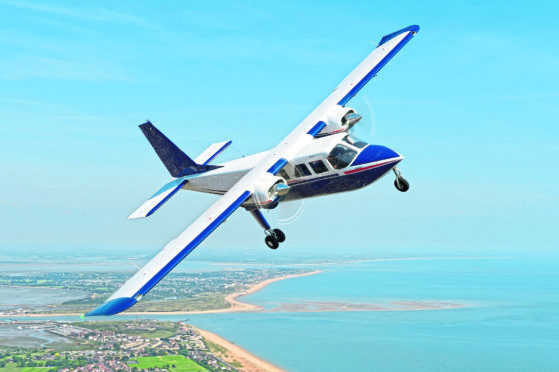A project which could see the world’s first electric –powered commercial passenger flights take off in Orkney has won £9 million backing from the UK government.
Described as a “significant step forward” for the plan, the funding will be used to design, build and fit a hybrid propulsion system into the type of nine-seater plane used on “island-hopping” routes.
The ambition of Scottish airline Loganair, working with researchers at Cranfield University, to claim a global first by introducing electric aircraft in Orkney by 2021 was revealed by the P&J last year.
An industry consortium has since been formed to drive the plans forward, under the banner of “Project Fresson,” named after 2Oth-Century Highlands and Islands air pioneer, Captain Ted Fresson.
British companies involved in the team along with Cranfield University and Cranfield Aerospace Solutions (CAeS) include Rolls-Royce, the Denis Ferranti Group, Islander aircraft manufacturer Britten-Norman and the Warwick Manufacturing Group.
The multi-million pound Government grant for the project is being provided through the Aerospace Technology Institute (ATI) programme, the Department for Business, Energy and Industry and Innovate UK.
Mark Scully, head of technology for advanced systems and propulsion at the ATI, said: “Project Fresson brings together a great partnership to develop innovative technology for a sustainable all-electric air transport solution for isolated islands.
“The partners’ ultimate goal of delivering the first commercial passenger-carrying all-electric aircraft service in the UK will mark a significant breakthrough for all-electric propulsion.”
CAeS chief executive, Paul Hutton, said the demonstrator projects could be “rapidly developed” into equipment certified by international aviation authorities, “enabling the UK to lead the way with the first passenger-carrying sub-regional aircraft capable of all electric flight”.
“This is going to accelerate our green transport revolution,” he added.
Aberdeen-born Professor Iain Gray, Cranfield University’s director of aerospace, said Project Fresson was “at the forefront of turning the commercial use of electric aircraft into a reality”.
Earlier this year, Mr Gray said the island-hopping services in Orkney offered “an ideal introductory route for such an aircraft.”
He added that the Project Fresson team would be working closely with Loganair, Highlands and Islands Airports (Hial) and island councils.
Operated on behalf of Orkney Islands Council by Loganair, air services link the Orkney mainland with six small island airports to the north, including Stronsay, Sanday, North Ronaldsay and Eday.
The service includes the 1.7-mile hop between Westray and Papa Westray, which holds the Guiness World Record as the shortest scheduled passenger flight, lasting between 53 seconds and a minute-and-a-half, depending on wind speeds.
